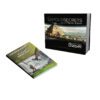No products in the cart.
Return To ShopDinosaurs Extinction: Noah’s Flood or an Asteroid?
Natural history museums promote the idea that an asteroid impact hitting the edge of the Yucatán peninsula in Mexico 66 million years ago was responsible for the final dinosaur extinction. While evolutionists have published over 90 different theories about this dinosaur extinction event, the asteroid theory takes the leading place in museums today. But how can this single event explain the simultaneous extinction of all dinosaurs around the world, including a massive dinosaur kill zone in North America that spans three countries and fourteen states, stretching over 1,800 miles long and 1,000 miles wide? Over a million square miles across the American West are filled with every kind of dinosaur, and they’re all mixed with other land animals (including birds and mammals) and all sorts of marine life like clams, rays, and sharks. Many of these dinosaur-filled layers are stacked one on top of the other. Could a single asteroid that hit over 1,500 miles away from the heart of this disaster zone really be responsible for all this? Watch the short video below to find out.

![[eBook] Thunderbirds and Flying Dragons: Giant Birds & Pterosaurs that Lived After the Flood](https://genesisapologetics.com/wp-content/uploads/2025/12/THUNDERBIRDS-PRODUCT-IMAGE-100x100.jpg)






